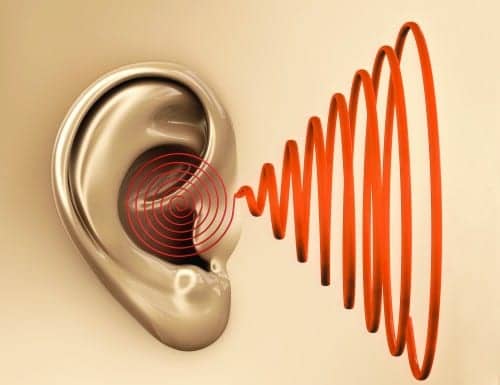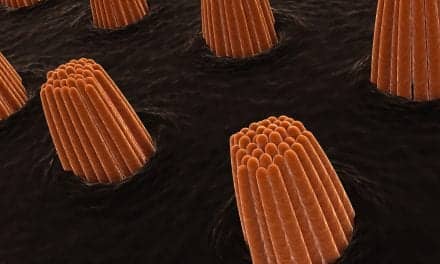In the largest US clinical trial of its kind funded by the Veterans Affairs (VA) Rehabilitation Research and Development Service, the VA Portland Medical Center and Oregon Health & Science University (OHSU) report that researchers have found that transcranial magnetic stimulation (TMS) significantly improved tinnitus symptoms for more than half of study participants. Their findings were published in an article in the July 16 online edition of the journal JAMA Otolaryngology – Head & Neck Surgery.
“For some study participants, this was the first time in years that they experienced any relief in symptoms,” said Robert L. Folmer, PhD, research investigator with the National Center for Rehabilitative Auditory Research at the VA Portland Health Care System, and associate professor of Otolarynology – Head and Neck Surgery in the OHSU School of Medicine. “These promising results bring us closer to developing a long-sought treatment for this condition that affects an enormous number of Americans, including many men and women who have served in our armed forces.”
According to the announcement from OHSU, tinnitus (ringing, buzzing, or hissing in the ears) affects nearly 45 million Americans, and the distraction can impair people’s ability to sleep or concentrate. Statistics from the Centers for Disease Control and Prevention show that nearly 15% of Americans experience some degree of tinnitus. Currently, there are no proven treatments available, so patients with the condition often develop coping strategies to manage their reaction to tinnitus. Military veterans are at greater risk of developing the condition, and tinnitus is the most prevalent service connected disability in the VA health system. Study participants were a mix of veterans and non-veterans.
“We applaud the work of Dr Folmer and his colleagues,” said Melanie West, chair of the American Tinnitus Association’s Board of Directors. “The results of the joint National Center for Rehabilitative Auditory Research/OHSU study are promising for tinnitus patients everywhere. “We are committed to finding solutions for tinnitus and excited to see the progression of TMS clinical trials producing positive results for some patients.”
For the research, Folmer and colleagues reportedly used a TMS system that generates a cone-shaped magnetic field that penetrates the participant’s scalp and skull to interact with brain tissue. The higher the stimulation intensity, the deeper the magnetic field can penetrate and affect neural activity. Currently, the Food and Drug Administration has approved transcranial magnetic stimulation only for treatment of depression.
All 64 participants enrolled in the tinnitus study received one pulse of TMS per second to their skull just above the ear to target the auditory cortex in the brain. The researchers had participants undergo TMS sessions on 10 consecutive workdays, during which they received 2,000 pulses of TMS. Of the 32 participants who received the “active” TMS treatment, 18 people found their tinnitus symptoms were alleviated for at least six months. To participate in the study, patients were required to have had tinnitus for at least a year or more. A significant number of participants who had tinnitus for more than 20 years reported receiving some relief from TMS treatment.
Dr Folmer hopes to conduct a larger clinical trial to refine protocols for the eventual clinical use of TMS for tinnitus.
Source: VA Portland Medical Center and Oregon Health & Science University; JAMA Otolaryngology – Head & Neck Surgery







I have had tinitus for a year now. I believe it is from an eyedrop medicine which is ototoxic and I was allergic to it when I had my cataracts done. I have a high pitched ringing in my ear 24/7. I have been to physical therapy; trying cranial sacrial therapy; acupuncture; massages monthly. Been to Mass Eye & Ear. Was told a study is promising. Any help in NE would be appreciated. Thank you.
Hello Diana. Just read your comment and am very interested to know how you came to that conclusion regarding the eye drops. I just had laser treatment for Glaucoma and have developed tinnitus in both earS in the same time period. Any info you have will be greatly appreciated. And lastly, have you found relief from any means? Per Guldbeck 260-246-2174. Thanks!
Ringing of ears have increased and I’m interested in treatment in Tampa Fl.
Please send information, if there treatment in this area.
Thank you
So does TMS work? Seen that this is a very old article. Had tinnitus for 20+ years. Its terrible to hear ringing from the time you wake till you go to sleep and very difficult to fall asleep.
I suffer from constant ringing in my left ear that has gotten louder over time. I appreciate any information that can be helpful with this problem. If there is a research center in Marana or Tucson Arizona I would be interested in participating.
I have ringing in ears I need some relief is there someone around Trenton mi that does tms.
Have there been any published results of trials.
Please can I have something for my tinnitus. Thanks
I am having Tinnitus for the last six years…Is there any hospital giving this TMS in dubai? Please let me know..
I think I got my tinnitus from the M60 machine gun. I’m retired from the Army and fired that and many other firearms but I really think it was the M60. I’d love to be rid of this ringing in my ears. I forget what it’s like not having it. I hear and read there is no cure. If this magnetic treatment works I’d love to get it but I don’t think the VA will approve treatment. How can I get in this study?
Have had tinnitus for years, never get used to it, still shocked that I have it. Not suppose to drink alcohol but ironically, until the next day, it’s the only relief I get
so try explaining that as an excuse to drink, they think ur just an addict. I keep it together for my kids. Gonna try TMS therapy
Ive had tinnitus and hypercusis for five years. Diet is huge. I cant believe there still is very little as far as treatments go.
TMS cost a fortune.
I’d love to hear what kind of diet works best for tinnitus. Thanks for any info you can provide.
Hello, I am writing this message in Turkey. In 2014, I was diagnosed with bileteral vestibular schwannoma. After diagnosis, I had a slow hearing loss until this time, and with this, there was an increase in tinnitus and it became unbearable. I got a Gamma Knife treatment for the tumor in the left ear, and thankfully I have no hearing loss in my left ear but I suffered loss of balance after Gamma Knife treatment. I am better at this point, but I am researching TMS for the reduction of tinnitus in the right ear, is there a clinic or hospital where you can apply this treatment properly in Turkey? Thank you.
Hi,
Recently, I was exposed to loud noise and I got mild tinnitus. I wonder if you could provide me of your latest trial results. I got so frustrated since I found out that there is no cure for tinnitus and I am not able to luve normally due to deppression. I am living in Canada and I would like to try TMS in case of promising results.
I highly appreciate your consideration
Thanks,
Megan
Hi, I have had mild chronic tinnitus for years and within the past year developed acute, extremely loud tinnitus in both ears. I have heard of some studies that have used cochlear implants and then done sound therapy to reroute neurons in the brain that think they need to make this noise to make up for hearing loss. I was wondering if you know if this study is still ongoing, or where it might be. I am also extremely interested in your study as well. I live in NH right outside of Boston. Thank you!
First of all I’m sorry to read about all the suffering here. Tinnitus is definitely a debilitating condition, and I wish you all relief.
We are a TMS center that treats tinnitus in California. Our TMS specialist Dr. Claudia Eppele studied at Harvard under the tutelage of a prominent TMS forerunner. We would be more than happy to discuss possible solutions. The protocol is only 10 sessions long (2 weeks including weekends), which makes it a possibility for those even out of state.
You can reach us at 855.867.5551 ext 795.
Warmly,
Cayce Howe
TMS Manager
I was told that my physio can get me to do a series of positions which will help the calcium deposits in my ears to be absorbed by my inner ear, curing me of my tinnitus. He will put a neck collar on me afterward and leave it for 48 hours after the exercises. In your view,is this possible?
I am 71 years old and was in the US Army from May 1968-May 1970. I suffer from Tinitus. I live in Tuscany, Italy. Can I ge treatment in Italy? Grazie, Lawrence
Please contact me about participation in this program if possible. I am a retired army sergeant and suffer from tinnitus. It is very frustrating to live with the ringing in my ear. I asked for help from the VA in Gainseville and they stated there is no treatment.
Is there any treatment available in India?
[email protected] joe noble combat vet Nam 67 68 been over 50 years for sleep for the last 5yrs I have been taking 2mg of lorazepam it work for ,don’t like to but I have to work and sleep .www.ljseedco.com good luck joe
As a sufferer of acute Tinnitus for the past 10 years I get increasingly frustrated at the lack of treatment offered to the millions of sufferers worldwide. All I hear and read is of trials, (some going back 20 years or more) where a decent percentage of those taking part got significant relief for several weeks or months, etc. Some of these trials involved tablets, magnetic pulses, sound therapies, etc. What I don’t understand then is why NOT OFFER IT TO THE SUFFERERS whose lives are blighted by this hateful affliction? If there appears to be a positive result no matter how small in certain people, then give the sufferers a chance to try it for themselves, if it gives relief great, if not give them the opportunity to try some other treatment that some people got relief from, but at least let them TRY some of these positive findings. It’s like saying to people demented by an illness, “Oh, out of 100 people, 65 of them got significant relief from this new treatment we’ve discovered, but we’re not offering anybody the chance to try it out, sorry, but no your not allowed to try it out.”
Hi Paul, I can certainly understand your frustration at the incremental progress of investigative research and the FDA-regulated protocols for clinical trials that we must follow here in the US (https://clinicaltrials.gov/ct2/about-studies/learn). At The Hearing Review we report on any research and trials we hear about so our readers are aware of what’s in the “pipeline,” but understand the frustration that results when many therapies in the pipeline get stalled before reaching the commercial market where consumers can put them to use. HR also reports on the therapies that do make it to market, and hope that you and others find our news about these helpful (https://hearingreview.com/?s=tinnitus). We, too, hope for more available therapies that bring relief to all!
Hi Paul,
We are a TMS center that treats tinnitus. Our TMS specialist Dr. Claudia Eppele would be more than happy to discuss your situation. You can reach us at 855.867.5551 ext 795.
Warmly,
Cayce Howe
TMS Manager
I was in a study 2 years ago with TMS & I lost my hearing so that I have to wear hearing aids & the tinnitus is 24/7 making it impossible to sleep. Taking lots of meds to put me to sleep. Treatment was Nov. 2014.
I’m from England and will happily book a flight to participate in this study.
Who can we contact to participate in Dr. Folmer study of TMS?
Hi Caroline,
Your best bet would be to try contacting Dr. Folmer or his associates at the National Center for Rehabilitative Auditory Research (NCRAR). His email and phone number are available at this link: http://www.ncrar.research.va.gov/AboutUs/Staff/Folmer.asp
I have had pulsatile tinnitus and hyperacusis for 8 years. It’s mainly affected my left ear, but occasionally my entire head. I try to lead a normal life as a teacher, but could easily become reclusive. I would love to be part of this study. The thought of any relief would be a life saver.
Hi Marjorie
Some pulsatile tinnitus may be curable. It is different from other types of tinnitus. There has been a trial of a surgical procedure as a possible treatment for select cases of this particular type of tinnitus. Read about it here: http://www.ncbi.nlm.nih.gov/pubmed/17195746
God bless you! 🙂
I’m 52 year old female, and I’ve had progressive tinnitus for the past 34 years of my life. I’ve tried Hearing Aids, and it didn’t work. It magnified the noise and I couldn’t hear anything.
I have had Tinnitus for about 10 years. I am a school teacher and currently wear hearing aids in order to hear my students and the world around me. I WANT TO BE A PART OF THIS STUDY! I knew that in time someone would come up with a cure for this and that person just might be YOU! I currently live in New Mexico but will go where I need to go and do whatever it takes to be a part of this study. HELP?
I’m 68 years old. Cannot remember a time when I did not have this ringing in my ears.
I have had ringing in my ears for a week now due to a medication the VA gave me. This is horrible. How can I be a part of your study?
Aisha,
Some drugs are ototoxic (toxic for ears), and sometimes the symptoms caused by ototoxic drugs are reversible, but you must stop taking them! [Speak with your doctor about an alternative drug.] Once you stop taking the ototoxic drug, your ears may go back to normal. For more information, see: http://www.sanuthera.com/list-of-ototoxic-drugs-that-cause-tinnitus/
Get well!
I live in Germany. How can I sign up for the study? I have had tinnitus since end of October. The reason is unclear, and nothing seems to help. Prednisolone, injections had no result. Thanks.
Hi Ana Maria,
Unfortunately, this particular tinnitus study is US-based. It’s possible that Dr Folmer, who runs the study, has colleagues in Germany who may be conducting similar studies, so you may try contacting him (http://www.ncrar.research.va.gov/AboutUs/Staff/Folmer.asp). Otherwise, you might work with your audiologist for help with one or more of the tinnitus therapies we have discussed in the following Hearing Review articles:
https://hearingreview.com/2015/04/study-explores-mindfulness-based-tinnitus-stress-reduction/
https://hearingreview.com/2015/11/soundcure-serenade-tinnitus-receives-licensing-approval-canada/
https://hearingreview.com/2015/08/controlled-study-effectiveness-fractal-tones-subjects-minimal-need-amplification/
https://hearingreview.com/2015/06/mindfulness-based-tinnitus-stress-reduction-unraveling-gordian-knot-tinnitus/
I hope this information is helpful, and perhaps some of our readers will know of tinnitus therapies that are currently available in Germany.
I have had tinnitus for over 20 years now, and have tried just about every snake oil treatment that comes along, with absolutely no relief. It causes serious depression. Unable to sleep,..would give anything to make it stop.
Steve I feel your pain. I’m going in to do the rtms treatment on January 25. Wish me luck bc I’m also scared and most of all I hope it works and I will post my results. I wish you luck and God bless and hopefully it will get better. I promise.
Sorry George …did your rtms work?
My case began after an industrial accident on job in 83. A boiler exploded a few hundred feet away from me & the blast perforated my L eardrum. Ive worked on many construction jobs where loud equipment roared all day beginning around 1970, yet I dont recall ear protection required on jobs b4 the 90’s. Ive dealt with anxiety & depression 4some time & am sure it factors in my ability2concentrate. I hear several pitches of ringing 24/7 & its very loud. I understand audiologists say it can b heard outside a victims ears by others. Ive been hoping4stem cell regeneration of the ear drum but thats probly still a long ways off. Maybe this could help if the treatment were not priced out of sight. Would love 2try it if I can find it available anywhere near NE Ohio where I now live. It would be a huge relief even if improvement is only partially effective.
My tinnitus is described as the worse case ever treated by my audiologist. I’d give my right arm to rid myself of this torturous disorder! Unfortunately, absolutely NOTHING has relieved my symptoms…33 years and counting. At this point, I’d gladly volunteer to be a guinea pig for any of these studies. Suffering from tinnitus is like having your own personal torture chamber inside of your head that will not turn off… Ever! Sleep is a misnomer! Depressive disorder / anxiety disorder par for the course at best, at worst, a debilitating by-product of the most prevalent disorder suffered by our military veterans. It’s about time this disorder received the research and attention our veterans so richly deserve.
How can I sign up for this? I’ve had tinnitus since the 80s, wear hearing aids, and have used the tinnitus sound relief programs to no avail. I’m 58. Tinnitus is worse in the daytime so I still can sleep at night, but am almost suicidal during the day.
We’re not sure when the larger clinical trial using the TMS system for tinnitus will commence, but you might contact researcher Robert Folmer, PhD, for more information about that (http://www.ncrar.research.va.gov/AboutUs/Staff/Folmer.asp). If you’re located in the US, you might also contact the ATA (https://www.ata.org/) to find out if there are any other clinical trials for tinnitus underway in your area that you can sign up for. We hope you find some relief from your symptoms, and thanks for joining the discussion!
Millions of us with lyme disease, which is a toxic “soup” of many pathogens, have horrible tinnitus. Some have seen the disappearance of their tinnitus with antibiotics. Mine seems to continue unabated.